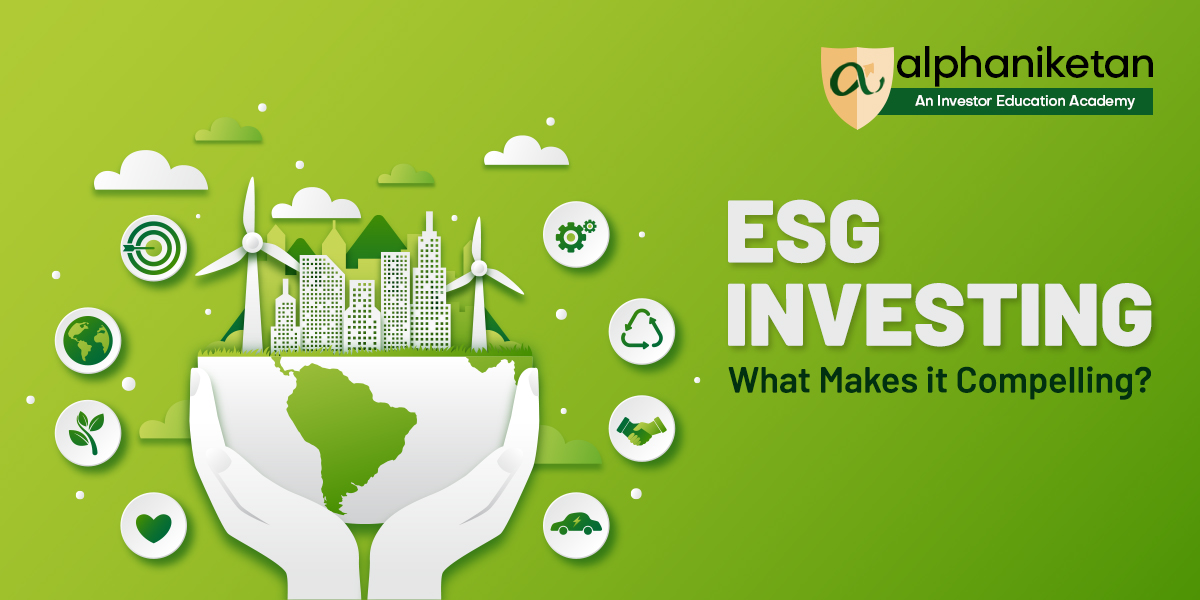While the sole objective of investing is to make money, once in a while we also like to feel good about ourselves while going about the act. This wave of investing in a socially responsible way has caught on globally in a big manner in these past few years.
We call it ESG or Environmental, social and corporate governance investing which basically strives to strike a balance between making money while investing responsibly.
So how large is this wave? Well, ESG investing today is pretty big at a global scale – touching almost a cool USD 4 trillion as of September 2021!

“ESG ratings, which are now applied to companies representing around 80% of market capitalization in 2020, have evolved in recent years to incorporate long-term financial risks and opportunities in investment decision-making processes,” a detailed report by the institution said in late 2021.
So what’s happening closer to home, India?
Well, no surprises there – there has been a steady rise in the interest levels in our markets as well, especially amongst Millennials and Gen Z since the pandemic. They looked up responsible investment avenues as a way to battle an enormous disruption caused in our history. So today about 12 mutual funds manage about $1.5 billion in equity assets which is on a clear J curve path.
More levers are being introduced to push this bandwagon – the Indian government recently announced the creation of green bonds to boost further investing in ESG compliant companies. In fact, ahead of the mother of all IPOs to hit the Indian markets since our Independence in 1947, the Life Insurance Corporation of India is likely to seek ESG certification before lighting up the Indian bourses.
The Securities and Exchange Board of India, the stock market regulator in India, has put out a discussion paper on creating a new category of intermediaries called ESG Ratings Providers. That is on the lines of credit rating agencies that give ratings to any form of debt paper.
All of that highlights the importance of the ESG compliance of listed companies. It also means you get the satisfaction of investing in businesses that not only generate wealth but do social good.
However, is it all as good as it looks?
The OECD in the report flags a lot of challenges. The performance of ESG funds over the past decade is a mixed bag. Integration of ESG factors has a range of impacts on the financial performance of companies. That ranges from overperformance and underperformance relative to market returns. There is an improved sentiment due to enhanced governance and better risk management. However, a growing number of studies point to the underperformance of ESG-tilted indices and portfolios compared to neutral market portfolios.
The mixed bag performance is attributed to the multiple ESG reporting and rating approaches. The OECD report finds that the ESG reporting is not sufficient by businesses. At the same time, the rating approaches do not clarify the financial, social, or environmental impact on businesses for investors to get a clear picture of whether the ESG activity is a net positive or a net negative on the financial performance.
These concerns matter because investors in rich countries with high incomes are constantly looking to make ESG a priority investment.
The growing interest in India means regulators need to learn from the experience in rich countries. A majority of Indian investors are buying into ESG funds because of superior risk-adjusted returns they offer than for doing good, according to one survey by the CFA Institute. The market in India is relatively small. The process of certification of ESG companies is also at an early stage.
Every investment you make needs to have a goal. That is plain old ‘Investing 101’. The ESG assessment of a company is still subjective in many cases today. There are differences in production processes, fuel savings, employee policies, continuous disclosures across businesses. It may take some time before one can develop a clear metric to measure the ESG impact on businesses. Till then, you need to keep ‘doing good’ on top of your agenda while looking at ESG funds or companies. Oh by the way, while we are on this topic, we are truly stoked to share with you that our ESG alphamatter has notched a cool 101.7% CAGR returns since inception! Do check it out on www.alphaniti.com!
Thank you for reading this post, don't forget to subscribe!




